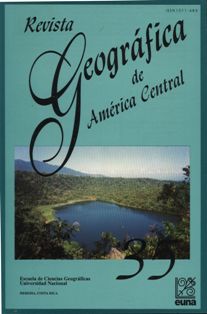EL TURISMO Y LA CONVIVENCIA COMUNAL EN UN ÁREA RURAL-COSTERA
Abstract
En el presente artículo el lector podrá encontrar algunos aspectos relacionados con el turismo como actividad económica y su expresión concreta en las comunidades de Tambor y Montezuma de Cóbano, provincia de Puntarenas, Costa Rica. Pero además y es la parte fundamental del mismo se hace referencia aquí al impacto que ha tenido este sector en la convivencia comunal y cotidianidad de esas comunidades.
Este impacto se analiza en tres dimensiones específicas: la socioeconómica, la cultural y la ambiental.
En síntesis y como producto de los efectos del turismo, la zona analizada sufre una transformación importante que engloba la convivencia comunal; convivencia que en sus manifestaciones generales coincide en cierta medida con el contexto nacional y mundial, pero que también tiene su particularidad. En este sentido, se nota una re-dimensión en la individualidad de actor y sector social, pero además en la totalidad de la convivencia comunal. Esta re-dimensión, si bien es producto de actividades económicas de sistemas productivos y de nuevas estrategias de desarrollo globalizantes, se manifiesta en lo social, en lo cultural y en la relación sociedad naturaleza ó ambiente a nivel local, como un producto más divertido de la actividad turística.
Abstract:
This paper discusses the effects of the tourism industry in the communities of Tambor and Montezuma, Cobano, province of Puntarenas, Costa Rica. If focuses in the impact and tourism in peoples everyday life from on three- fold perspective: socio-economic, cultural and evironmental.
Regarding the impact of tourism in the socioeconomic dimensión the study revels an important change in the labor market, which was traditionally related to farming and fishing, now oriented to the production of goods and services for tourists and other economic activities take place in medium and small scales and involve men and women, Young and adults. They generate different social and interpersonal relations, which contribute to change comunal daily coexistence.
In the cultural discussion tourism had changed daily like in these communities and patterns of social coexistence. Among the most significant changes are customs and holidays, clothing styles, the loss of traditional forms of communication, the beginning of different ways of dialoging and new relationships among neighbors, and even of the way people talk and how and whit they eat.
In relation to the environment the new ways to relate to nature and of trying to manage and handle the natural resources the awareness and the new attitude in regard to the environmental situation, as well as the wormiest for conservation. For having clean and healthy surroundings, among others, had the collective levels.
To summarize as a result of the effects of tourism an important transformation is talking place in the communities under study that coincides with the national and global context to a certain extent, but to also has its own particularities. In this sense, it is noticeable a re-definition of the individuality of each actor and social sector and in the totality of the communal identify as well. Eventhough that redefinition is the result of economic activities, of economic systems and new globalized developmental strategies, also effects in the social and cultural aspects and in the relation men-nature in a local level.
Downloads
How to Cite
Issue
Section
License
Proposed policy for journals offering Open Access
Authors publishing their works in the Journal acknowledge and agree to the following terms:
a) Authors retain the copyrights to their works and guarantee the Journal the right to be the first to publish their works, under the Creative Commons License Attribution-NonCommercial-ShareAlike 4.0 International, CC BY-NC-SA 4.0 International (https://creativecommons.org/licenses/by-nc-sa/4.0/deed.es), which allows others to share works upon complying with the acknowledgment of authorship and mention of the Journal as the original publisher of the work.
b) Authors are permitted to separately establish additional agreements for the non-exclusive distribution of the official edition of the work published in the Journal (for example, authors may desire to place the work in an institutional repository or incorporate it into a book that is to published elsewhere) so long they acknowledgment to recognize the Journal as the original publisher. The aforementioned additional agreements must respect the terms of the non-profit character and sharing philosophy of the original license (CC BY-NC-SA 4.0 International, https://creativecommons.org/licenses/by-nc-sa/4.0/deed.es).
c) Authors are encouraged to archive the post-print or editor/PDF version in Open Access repositories.






 REVGEO is licensed under https://creativecommons.org/licenses/by-nc-sa/4.0/deed.es
REVGEO is licensed under https://creativecommons.org/licenses/by-nc-sa/4.0/deed.es
.svg_4.png)

_(1).png)
_(1)_(1)_(1)_1.png)
(2)(1)(1)(1).png)
